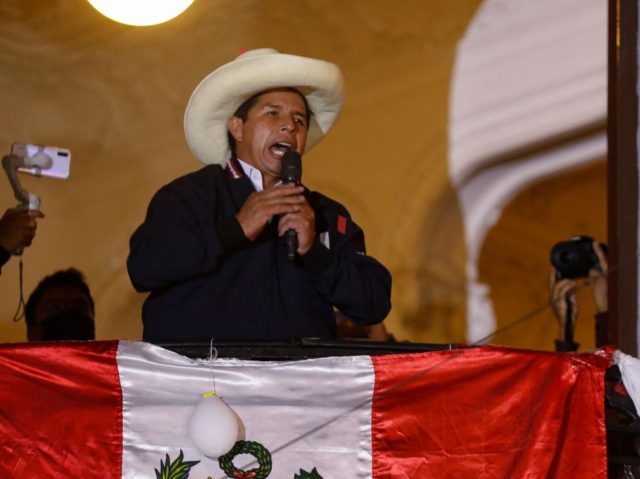Communist candidate Pedro Castillo appears to have won the Peruvian presidential election as of Wednesday afternoon in a tight race separating him from rival conservative Keiko Fujimori by less than 0.5 percent of the vote.
Peru’s National Office of Electoral Processes (ONPE), which verifies and counts every vote, had completed 99.795 percent of the tally as of Wednesday morning local time. With over 18.5 million votes counted, including 100 percent of ballots from abroad, Castillo was holding firm with 50.206 percent of the vote to Fujimori’s 49.794 percent.
The runoff election, resulting from the presidential general election results in April, presented Peruvians with one of the starkest ideological contrasts on a presidential ballot anywhere in the world. Castillo’s Free Peru party identifies itself as socialist and progressive. The party platform openly praises communist totalitarians Fidel Castro and Vladimir Lenin. Opponents have accused Castillo of having ties to the Shining Path terrorist movement, though he has denied the allegations.
“Socialism does not advocate for freedom of the press, but for a press committed to education and the cohesion of the people,” Free Peru’s official party platform reads in part. “[Vladimir] Lenin had a great point when he said that true freedom of the press is only possible when it is liberated from the yoke of capitalism. Fidel [Castro] also said: ‘…mass media are in the hands of those who threaten human survival with their immense economic, technological, and military resources.'”
Fujimori, in contrast, began her political career as a stand-in first lady following her parents’ divorce. The daughter of conservative former President Alberto Fujimori – whose legacy includes the eradication of Shining Path and arrest of leader Abimael Guzmán – Fujimori has successfully made it into a runoff election three times, campaigning on improved support for police, law and order, pursuit of foreign investment, and undoing socialist government policies. A runoff election pits the top two vote-getters in a general election against each other when no presidential candidate obtains 51 percent of the vote.
Both Castillo and Fujimori are facing legal trouble. Police opened a case against Castillo in May over suspicions that he falsified records to get on the ballot. Fujimori was arrested in 2018 for allegedly taking bribes from disgraced contracting firm Odebrecht; the case remains ongoing.
The ONPE has not declared a winner in the presidential election at press time and Fujimori has indicated she would not concede. Castillo maintained a consistent lead in polls prior to the election, but Fujimori appeared ahead for much of the tally – a phenomenon ONPE, based in Lima, attributed to the fact that the votes from the capital were counted first as they came from places closest to the agency’s headquarters. Lima and surrounding urban areas skewed largely towards Fujimori, while the remote Peruvian countryside went decisively for Castillo.
Fujimori alleged on Tuesday night that “systematic” fraud plagued the election and took away her victory and urged Peruvians to use social media to share evidence of fraud. Her party, Popular Force, also shared videos with the media allegedly showing election volunteers illegally tampering with ballots or advocating for the disqualification of ballots based on faulty reasoning. The secretary-general of Popular Force, Luis Galarreta, also claimed that as many as 1,200 voter rolls were discarded inappropriately based on incorrect claims that they were not properly filled out. The ONPE has not supported this claim.
Galarreta also challenged other voter rolls that appeared to have improbable outcomes, such as one roll from a ward that showed Castillo with 187 votes and Fujimori with zero, despite Fujimori polling well in that area. Neither Fujimori nor her party have accused the ONPE or the Peruvian government of fraud – only Free Peru volunteers on the ground.
Police have confirmed an investigation into at least one credible accusation of fraud against a Free Peru volunteer named Emerson Vargas Aspajo, according to Peru’s El Comercio.
Castillo’s public remarks following the election have urged from the public calm and not proclaimed victory. Apparently in response to concerns from both Fujimori voters and international observers that a Leninist president would lead the country to tyranny, he walked back at least one campaign promise on Tuesday: that of scrapping the 1993 Peruvian constitution and writing a new one.
“We will be a government respectful of democracy, of the current Constitution, and we will make a government with financial and economic stability,” Castillo vowed.

COMMENTS
Please let us know if you're having issues with commenting.